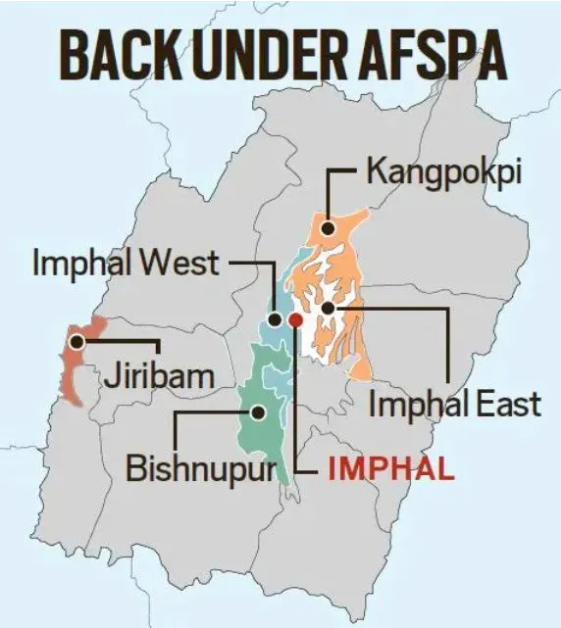16 November 2024 : Indian Express Editorial Analysis
1. Blunt Instrument
(Source: Indian Express; Section: The Editorial Page; Page: 12)
| Topic: GS3 – Internal Security |
| Context: |
| The article crticizes the reimposition of AFSPA in Manipur amidst prolonged ethnic conflict, emphasizing the need for political and administrative reforms over repressive measures. |
What is AFSPA?
- The Armed Forces (Special Powers) Bill was passed by both the Houses of Parliament and it was approved by the President on September 11, 1958. It became known as the Armed Forces Special Powers Act (AFSPA), 1958.
- The Act came into force in the context of increasing violence in the North-eastern States decades ago, which the State governments found difficult to control.
- The AFSPA gives unbridled power to the armed forces and the Central Armed Police Forces deployed in “disturbed areas” as specified under the Act to kill anyone acting in contravention of law, arrest and search any premises without a warrant and ensures protection from prosecution and legal suits without the Central government’s sanction.
- The State and Union government can issue notification regarding the AFSPA. For the States of Arunachal Pradesh and Nagaland, the MHA issues periodic “disturbed area” notifications.
What are the Disturbed Areas described under AFSPA?
- A disturbed area is one that is declared by notification under Section 3 of the AFSPA. It can be invoked in places where the use of armed forces in aid of civil power is necessary.
- The Act was amended in 1972 and the powers to declare an area as “disturbed” were conferred concurrently upon the Central government along with the States.
- An area can be disturbed due to differences or disputes between members of different religious, racial, language or regional groups or castes or communities.
- The Central Government, or the Governor of the State or administrator of the Union Territory can declare the whole or part of the State or Union Territory as a disturbed area.
- Once declared ‘disturbed’, the region is maintained as disturbed for a period of three months straight, according to The Disturbed Areas (Special Courts) Act, 1976. The government of the state can suggest whether the Act is required in the state or not.
- Currently, the Union Home Ministry issues periodic “disturbed area” notification to extend AFSPA only for Nagaland and Arunachal Pradesh.
Prolonged Ethnic Conflict in Manipur

- Manipur has been grappling with severe ethnic conflict for 19 months, marked by inadequate government responses. The state government has resorted to superficial measures such as blaming external forces, imposing internet bans, and issuing vague promises of dialogue.
- At the national level, the Centre’s attempts to mediate have also fallen short, failing to inspire trust. A recent surge in violence has prompted the Union Home Ministry to reimpose the Disturbed Area status under the Armed Forces (Special Powers) Act (AFSPA) in select areas.
- This decision, while limited in geographical scope, risks exacerbating tensions due to the deeply entrenched opposition to AFSPA in Manipur and other Northeastern regions.
Roots of the Conflict: Ethnic Faultlines and Governance Failures
- Ethnic identities have long shaped Manipur’s social, economic, and political landscape.
- The current conflict stems from the Meitei demand for Scheduled Tribe (ST) status, which was met with resistance from Kuki-Zomi groups.
- The violence has displaced thousands, disrupted livelihoods, and deepened mistrust between communities. Informal defense committees now patrol villages, highlighting the lack of state security presence and coordination.
- Over 5,000 weapons looted during the conflict remain unaccounted for, underscoring governance breakdown. Furthermore, the state government’s narrow focus on law and order, rather than addressing underlying socioeconomic and political grievances, compounds the difficulties faced by security forces.
- This myopic approach is particularly concerning given the region’s geopolitical sensitivities, with instability in neighboring Myanmar and Bangladesh adding to the complexity.
The Legacy of AFSPA in Manipur
- AFSPA’s history in Manipur is fraught with controversy. Initially imposed in 1958 in Naga-dominated districts, the Act was gradually extended to other parts of the state, eventually covering the Meitei-dominated Imphal Valley in 1979 amidst rising insurgency.
- The Act’s sweeping powers, including immunity for armed forces, have made it highly unpopular, leading to widespread protests. Activist Irom Sharmila’s 16-year hunger strike against AFSPA and the 2005 Jeevan Reddy Commission’s recommendation for its repeal highlight the Act’s contentious nature.
- The Second Administrative Reforms Commission echoed these calls for repeal, emphasizing its negative impact on civil liberties. Despite AFSPA’s partial rollback in other Northeastern states due to declining militancy, Manipur remains an exception, reflecting its persistent challenges.
A Need for Comprehensive Political and Administrative Reforms
- Manipur’s trajectory from being one of the most prosperous Northeastern states to lagging in socioeconomic indicators underscores the urgent need for systemic reforms.
- Development initiatives, as emphasized by Union Home Minister Amit Shah, have facilitated the rollback of AFSPA in other regions. However, Manipur’s unresolved ethnic tensions, poor governance, and lack of political will have impeded progress.
- The reimposition of AFSPA, a blunt instrument, risks deepening existing mistrust and alienating affected communities.
- Addressing the conflict requires a holistic approach that includes fostering dialogue, rebuilding trust between communities, and strengthening administrative capacity.
- Political and developmental interventions, rather than repressive measures, are crucial to restoring stability and fostering long-term peace in the state.
| What are the Arguments in Favour and Against of AFSPA? |
|
Addressing Ongoing Security Challenges:
Empowering Security Forces:
Legal Protections for Personnel:
Boosting Morale:
|
| PYQ: Human rights activists constantly highlight the view that the Armed Forces (Special Powers) Act, 1958 (AFSPA) is a draconian act leading to cases of human rights abuses by the security forces. What sections of AFSPA are opposed by the activists? Critically evaluate the requirement with reference to the view held by the Apex Court. (200 words/12.5m) (UPSC CSE (M) GS-3 2015) |
| Practice Question: Discuss the implications of the prolonged ethnic conflict in Manipur on governance and societal stability. Analyze the role of measures like AFSPA in addressing such conflicts and suggest alternative approaches for sustainable peace and development. (250 words/15 m) |


